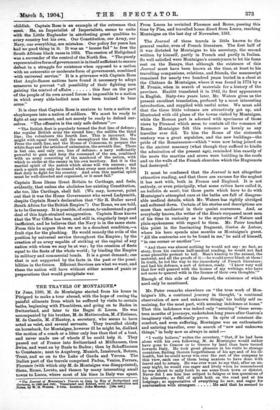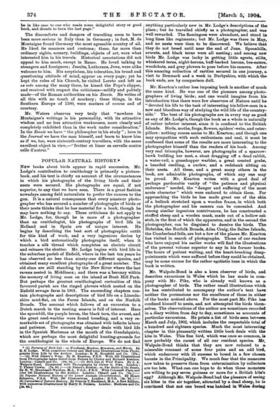THE TRAVELS OF MONTAIGNE.*
IN June, 1580, M. de Montaigne started from his home in Perigord to make a tour abroad, with the hope of curing the painful ailments from which he suffered by visits to certain baths, beginning with Plombieres, and going on to Baden in Switzerland, and later to the Bagni di Lucca. He was accompanied by his brother, M. de Mattecoulon, M. d'Estissa,c, II. de Caselis, M. d'Hautoy, a secretary, who seems to have acted as valet, and several servants. They travelled chiefly -on horseback, for Montaigne, however ill he might be, disliked the motion of a coach or a litter only less than that of a boat, and never made use of wheels if he could help it. They passed out of France into Switzerland at Miilhausen, then Swiss, and went on by Basle to Baden; then by Schaffhausen to Constance; next to Augsburg, Munich, Innsbruck, Botzen, Trent, and so on to the Lake of Garda and Verona. The Italian part of the travels comprised Padua, Venice, Ferrara, Florence (with which city M. de Montaigne was disappointed), Siena, Rome, Loreto, and thence by many interesting small towns to Laces, where most of his time in Italy was spent.
• Tito Journal of Montaigne's Travels in Italy by Way of Suiteirland and Germany, in 1390 and 1581. Translated and Edited, with an Introduction and .biates,by W. G. Waters. 3 rob. Landon: John Murray. [Us. Der.]
From Lucca he revisited Florence and Rome, passing this time by Pisa, and travelled home direct from Lucca, reaching Montaigne on the last day of November, 1581.
The Journal of these travels is little known to the general reader, even of French literature. The first half of it was dictated by Montaigne to his secretary, the second
written by himself, partly in French and partly in Italian. So well satisfied were Montaigne's countrymen to let his fame
rest on the Essays, that although the existence of this Journal must have been known at the time, at least to his travelling companions, relations, and friends, the manuscript remained for nearly two hundred years buried in a chest at the Château de Montaigne, where it was found in 1774 by a
M. Prunis, when in search of materials for a history of the province. Hazlitt translated it in 1842, its first appearance in English. Sixty-two years later, Mr. Waters gives us the present excellent translation, prefaced by a most interesting introduction, and supplied with useful notes. We must add that the three little volumes are attractively got up, and illustrated with old plans of the towns visited by Montaigne, while the Roman part is adorned with specimens of those views by Piratical which seem to contain all the romance of Rome. Montaigne felt this romance as keenly as any traveller ever did. To him the Rome of the sixteenth century was a great sepulchre, and the new buildings—the pride of the Renaissance—which "were now being joined on to the ancient masonry (what though they sufficed to kindle the admiration of the present age), reminded him exactly of the nests the martins and crows were building in the roofs and on the walls of the French churches which the Huguenots had destroyed."
It must be confessed that the Journal is not altogether attractive reading, and that there are excuses for the neglect it has met with, both in France and England. It is not entirely, or even principally, what some critics have called it, un bulletin de sante, but those parts which have to do with
Montaigne's attempted cure at the baths are full of disagree- able medical details, which Mr. Waters has rightly abridged
and softened down. Certain of his stories and descriptions are more than mediaeval in their quaint coarseness. And, as everybody knows, the writer of the Essais surpassed most men of his time in curiosity as to the mysteries of Nature and
plain-spokenness with regard to them. Mr. Pater touched
this point in the fascinating fragment, Gaston de Latour, where his hero spends nine months as Montaigne's guest. "All the contraries are to be found in me," he said of himself, "in one corner or another ":— " And there was almost nothing he would not say : no fact, no story, from his curious half-medical reading, he would not find some plausible pretext to tell. Man's kinship to the animal, the material, and all the proofs of it :—he would never blush at them! In truth, he led the way to the immodesty of French literature ; and had his defence, a sort of defence, ready. 'I know very well that few will quarrel with the licence of my writings, who have not more to quarrel with in the licence of their own thoughts."
Enough of this side of the Journal, the existence of which need only be mentioned.
Mr. Pater remarks elsewhere on "the true work of Mon- taigne's life, a continual journey in thought, 'a continual observation of new and unknown things,' his bodily self re- maining, for the most part, with seeming indolence at home." That this indolence was indeed only "seeming" these seven- teen months of journeys, undertaken long years after Gaston's imaginary visit, sufficiently prove. In spite of constant dis- comfort, and even suffering, Montaigne was an enthusiastic and untiring traveller, ever in search of "new and unknown things," in body now as always in mind :—
"I verily believe," writes the secretary, "that, if he had been alone with his own following, M. de Montaigne would rather have gone to Cracow or to Greece by land than have turned towards Italy. He took great pleasure in his visits to strange countries, finding therein forgetfulness of his age and of his ill- health, but he could never win over the rest of the company to this view, each one of them being anxious to have done with travel and to return. He was ever wont to say that, after an un- easy night, he would rise eager and lively when he remembered he was about to sally forth to see some fresh town or district. Never did I see him less subject to fatigue or less querulous of his ailments ; so full of spirit both on the road and at his lodgings ; so appreciative of everything he saw, and eager for
conversation with strangers He said that he seemed to
be in like ease to one who reads some delightful story or good book, and dreads to turn the last page."
The discomforts and dangers of travelling seem to have been more serious in Italy than in Germany ; in fact, M. de Montaigne found Germany the most agreeable country of all. He liked its manners and customs; these, far more than ordinary sights, scenery, buildings, objects of art, were what interested him in his travels. Historical associations did not appeal to him much, except in Rome. He loved talking to strangers and foreigners ; Jesuits, Lutherans, Jews, were alike welcome to him. His scepticism, his toleration, his broad and questioning attitude of mind, appear on every page; yet he kept the rules of his Church, he visited Loreto and left an ex vote among the many there, he kissed the Pope's slipper, and received with respect the criticisms—mildly and politely made—of the Roman authorities on his Essais. He writes of all this with no touch of mockery ; these things, in the Southern Europe of 1580, were matters of course and of courtesy.
Mr. Waters observes very truly that "nowhere in Montaigne's writings is his personality, with its attractive wisdom and no less attractive weaknesses, more clearly and completely exhibited than in the work under consideration." In the Essais we have "the philosopher in his study " ; here in the Journal we have the man himself, and learn to know him as if we, too, were sixteenth-century travellers, with the same excellent object in view,—" trotter et limer sa cervelle contre ce]le d'autrui."











































 Previous page
Previous page